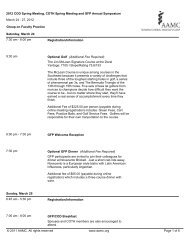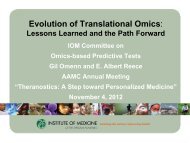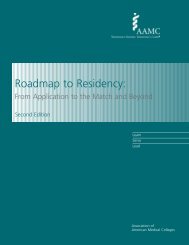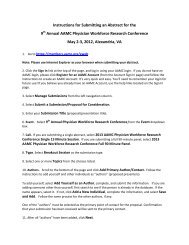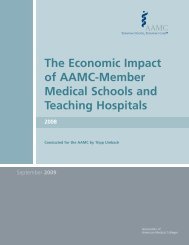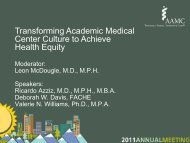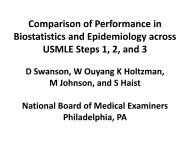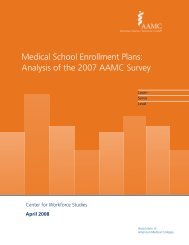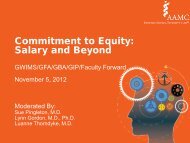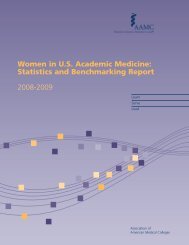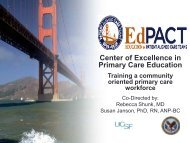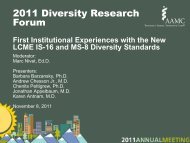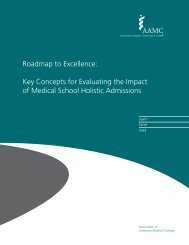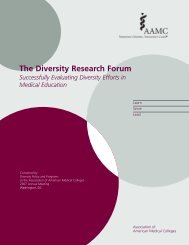Medical Students with Disabilities: A Generation of Practice
Medical Students with Disabilities: A Generation of Practice
Medical Students with Disabilities: A Generation of Practice
You also want an ePaper? Increase the reach of your titles
YUMPU automatically turns print PDFs into web optimized ePapers that Google loves.
<strong>Medical</strong> <strong>Students</strong> <strong>with</strong> <strong>Disabilities</strong>:<br />
A <strong>Generation</strong> <strong>of</strong> <strong>Practice</strong><br />
Institutional<br />
“Must Do’s”<br />
✔ Evaluate policies and procedures.<br />
Review institutional policies on a regular<br />
basis to ensure that they are in compliance<br />
<strong>with</strong> federal statutes and regulations,<br />
reflect advances in adaptive and assistive<br />
technology, and achieve the maximum<br />
degree <strong>of</strong> compliance under the circumstances.<br />
Make sure policies are realistic<br />
and “livable,” and then consistently adhere<br />
to those policies as situations arise.<br />
Be conscious <strong>of</strong> the timing <strong>of</strong> policy<br />
revisions and implementation and be<br />
wary <strong>of</strong> implementing policies that<br />
single out or address a specific student<br />
after a student has raised a disabilityrelated<br />
issue.<br />
✔ Develop/refine technical standards<br />
and essential program requirements.<br />
Develop technical standards for admission<br />
to and graduation from the educational<br />
program <strong>with</strong> great care and consideration.<br />
Include those skills and abilities that are<br />
essential to the completion <strong>of</strong> the<br />
educational program. Skills and abilities<br />
required for admission should be tied<br />
directly to those required for graduation.<br />
Any skill or ability required for admission<br />
should be tied directly to what is taught<br />
and assessed in the curriculum or it<br />
should be removed from the technical<br />
standards. Consider including “the ability<br />
to work as a member <strong>of</strong> the healthcare<br />
team” and “attendance” as essential<br />
program requirements.<br />
Where a required course is an essential<br />
element <strong>of</strong> the overall program, the school<br />
is not required to waive the requirement as<br />
an accommodation. Prospectively analyze<br />
which course requirements are essential to<br />
a student’s medical education and limit the<br />
school’s requirements to those identified<br />
courses. Other course <strong>of</strong>ferings should be<br />
treated as electives. With respect to the<br />
requirements <strong>of</strong> individual courses,<br />
schools should consider which elements<br />
are essential.<br />
✔ Review application forms and interview<br />
questions.<br />
Never ask an applicant about a past<br />
“handicap” or “disability.” Broad<br />
questions about past mental health<br />
history are unlikely to be allowed outside<br />
<strong>of</strong> a counseling or similar educational<br />
program. However, an institution may<br />
ask an applicant whether he or she is<br />
able to meet the program’s technical<br />
standards <strong>with</strong> or <strong>with</strong>out reasonable<br />
accommodations.<br />
A student’s disability is irrelevant in<br />
determining whether a student should be<br />
readmitted to a program. An institution<br />
may deny readmission to a former student<br />
<strong>with</strong> a disability if the student was<br />
dismissed based on the student’s performance,<br />
behavior, or academic record.<br />
However, the institution should be careful<br />
to not base its decision not to readmit<br />
a former student <strong>with</strong> a disability on<br />
stereotypes or nonfactual information.<br />
✔ Train employees and inform students.<br />
Provide training, on an ongoing basis, to<br />
academic administrators, faculty, and<br />
staff regarding students’ rights and each<br />
party’s responsibilities <strong>with</strong> respect to<br />
disability accommodation. The institution’s<br />
employees must understand their role in<br />
assisting the institution in meeting its<br />
compliance obligations. In addition,<br />
students should be informed <strong>of</strong> their<br />
rights and responsibilities and the<br />
institution’s procedures regarding<br />
disability accommodations.<br />
✔ Be careful when determining that an<br />
impairment is a disability.<br />
Evaluate each student’s case on an<br />
individual basis, relying on recent<br />
diagnostics and evaluations. Avoid<br />
overgeneralizations, broad categorizations,<br />
or relying on past accommodations<br />
made by other educational programs.<br />
Remember that merely having an<br />
impairment does not result in a student<br />
being disabled for purposes <strong>of</strong> the ADA<br />
or Section 504.<br />
More than a mere risk <strong>of</strong> injury is<br />
required before an institution may<br />
disqualify an applicant or student <strong>with</strong> a<br />
disability from participation in a program.<br />
Any denial <strong>of</strong> admission or decision to<br />
dismiss based on the risk <strong>of</strong> future<br />
injury to the individual or others must<br />
be examined <strong>with</strong> special attention to<br />
the requirements <strong>of</strong> the ADA and<br />
Section 504.<br />
✔ Monitor institutional compliance.<br />
It is imperative that an effective<br />
monitoring system be adopted to ensure<br />
that institutional policies are properly<br />
followed and that any policy violations<br />
are dealt <strong>with</strong> promptly. Too <strong>of</strong>ten,<br />
institutions rely on students to alert<br />
administrators to problems <strong>with</strong> their<br />
compliance systems. All compliance<br />
procedures should include monitoring<br />
provisions that regularly assess the<br />
effectiveness <strong>of</strong> the system and ensure<br />
that modifications are made as needed.<br />
✔ Maintain records.<br />
Protect the institution by thorough documentation<br />
that institutional procedures<br />
and policies reflect the current state <strong>of</strong><br />
the law and were properly followed, and<br />
that the action was properly reviewed<br />
and justified.<br />
31 Association <strong>of</strong> American <strong>Medical</strong> Colleges, 2005



